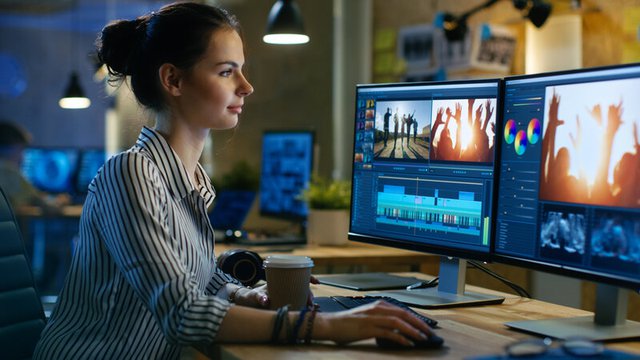
How to become a video editor?
Sept. 18, 2023

In the digital age, video content has exploded in popularity across various platforms, from YouTube to Netflix. Behind every engaging video we watch lies a skilled video editor. If you're intrigued by the art of video editing and want to know how to become one, you've come to the right place.
In this blog post, we'll explore what video editing entails, where video editors typically work, the tasks they handle, the essential skills required, and what to study if you aspire to be a video editor – such as an Audiovisual Translation Master.
What is a Video Editor?
A video editor is a creative professional responsible for transforming raw footage into polished and cohesive visual stories. They manipulate video and audio elements, apply special effects, and add transitions to create a seamless and engaging final product. Video editors play a crucial role in the post-production phase, ensuring that the content is not only technically flawless but also visually captivating.
Where do Video Editors work?
Video editors can work in various industries and settings, including:
- Film and Television: Many video editors find employment in the film and television industry, where they edit feature films, TV shows, documentaries, and commercials.
- Advertising Agencies: Advertising agencies hire video editors to create promotional videos and commercials for their clients.
- News Organisations: News outlets rely on video editors to assemble news stories and footage into compelling reports.
- Online Platforms: With the rise of YouTube, Vimeo, and social media, there's a growing demand for video editors to create engaging content for online audiences.
- Freelancing: Many video editors choose to work independently as freelancers, taking on a variety of projects from different clients.
Typical tasks of a Video Editor
The daily responsibilities of a video editor can vary depending on where they are employed and the size of the organisation, but they often include:
- Footage Selection: Reviewing and selecting the best shots and takes from the raw footage.
- Editing: Arranging selected clips in the desired sequence, trimming, and cutting as necessary.
- Audio Editing: Adjusting and enhancing audio elements, including dialogue, music, and sound effects.
- Visual Effects: Adding visual effects, transitions, and overlays to enhance the storytelling.
- Colour Correction: Ensuring consistent colours and visual tone throughout the video.
- Collaboration: Working closely with directors, producers, and other team members to bring their vision to life.
Skills a Video Editor should have
To excel as a video editor, you should possess the following skills:
- Proficiency in Editing Software: Mastery of industry-standard editing software like Adobe Premiere Pro, Final Cut Pro, or DaVinci Resolve.
- Attention to Detail: The ability to spot imperfections and ensure a polished final product.
- Creativity: A creative eye for storytelling and an understanding of visual aesthetics.
- Technical Proficiency: Knowledge of video formats, resolutions, and codecs is essential.
- Time Management: Effective time management skills to meet deadlines and handle multiple projects simultaneously.
- Communication: Good communication skills for collaborating with clients and team members.
What to study at university to become a video editor?
There are many routes into becoming a video editor, one of which is by studying the master mentioned earlier in this post. At Universidad Europea, our academic model is based on experiential learning, so you’ll gain the skills and knowledge necessary to be a success in the professional workplace from day one. You will have access to world-class facilities in which to learn including editing suites and translations labs. In addition, you will also take part in internships or work placements at leading companies in the sector, building up your experience and network of contacts.